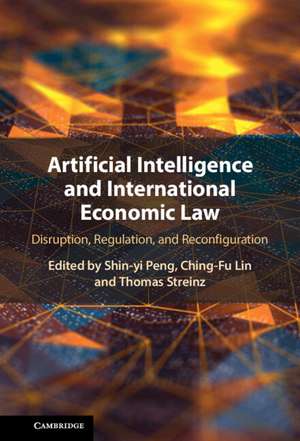Artificial Intelligence and International Economic Law: Disruption, Regulation, and Reconfiguration
Editat de Shin-yi Peng, Ching-Fu Lin, Thomas Streinzen Limba Engleză Hardback – 13 oct 2021
Preț: 727.01 lei
Preț vechi: 908.76 lei
-20% Nou
Puncte Express: 1091
Preț estimativ în valută:
139.16€ • 151.21$ • 116.97£
139.16€ • 151.21$ • 116.97£
Carte tipărită la comandă
Livrare economică 21 aprilie-05 mai
Preluare comenzi: 021 569.72.76
Specificații
ISBN-13: 9781108844932
ISBN-10: 1108844936
Pagini: 320
Dimensiuni: 158 x 235 x 25 mm
Greutate: 0.66 kg
Editura: Cambridge University Press
Colecția Cambridge University Press
Locul publicării:New York, United States
ISBN-10: 1108844936
Pagini: 320
Dimensiuni: 158 x 235 x 25 mm
Greutate: 0.66 kg
Editura: Cambridge University Press
Colecția Cambridge University Press
Locul publicării:New York, United States
Cuprins
Preface; 1. Artificial intelligence and international economic law: disruption, regulation, and reconfiguration Shin-Yi Peng, Ching-Fu Lin and Thomas Streinz; Part I. Systemic Shifts in the Global Economic Order: 2. Trade law in a data-driven economy: a call for modesty and resilience Gregory Shaffer; 3. Global law in the face of datafication and artificial intelligence Rolf H. Weber; 4. Trading AI: economic interests, societal choices and multilateral rules Dan Ciuriak and Vlada Rodionova; Part II. Reconceptualizing WTO Law for the Ai Economy: 5. Trade rules for industry 4.0: why the TBT agreement matters even more Aik Hoe Lim; 6. Autonomous vehicle standards under the TBT agreement: disrupting the boundaries? Shin-Yi Peng; 7. Convergence, complexity and uncertainty: AI and intellectual property protection Bryan Mercurio and Ronald Yu; 8. Are digital trade disputes 'trade disputes'? Yuka Fukunaga; Part III. Data Regulation as AI Regulation: 9. International economic law's regulation of data as a resource for the AI economy Thomas Streinz; 10. Data protection and artificial intelligence: the EU's internal approach and its promotion through trade agreements Alan Hervé; 11. Data portability in a data-driven world Frederike Zufall and Raphael Zingg; Part IV. International Economic Law Limits to AI Regulation: 12. Public moral, trade secret, and the dilemma of regulating driving automation systems Ching-Fu Lin; 13. International trade law and the data ethics: possibilities and challenges Neha Mishra; 14. Disciplining artificial intelligence policies: WTO law as a sword and a shield Kelly K. Shang and Rachel R. Du; V. Reconfiguration of International Economic Law: 15. Across the great wall: e-commerce joint statement initiative negotiation and China Henry Gao; 16. The next great global knowledge infrastructure land rush has begun: will the US or China prevail? Jane K. Winn and Yi-Shyuan Chiang; 17. Trade law architecture after the fourth industrial revolution Lisa Toohey.
Recenzii
'This book is a must-read for the AI policy community, which has been slow to reckon with the global political economy of AI. The focus on international economic law challenges the dominant conception of what counts as 'AI regulation' to expand beyond concerns of privacy and discrimination, even as it meditates on the potential limits of these regulatory approaches. As the economic drivers of AI and data regulation become increasingly explicit, this collection could not be more timely.' Amba Kak, Director of Global Policy & Programs, New York University AI Now Institute
'As the transformative force of artificial intelligence starts to define the future of our economies and societies, it gives rise to numerous complex legal questions at the international level. This book consolidates contributions that provide an eminently readable treatment of complex issues with a vision into the future of international trade. It offers an excellent point of reference for policymakers, practitioners, and scholars on such a vital subject for our future.' Hamid Mamdouh, Senior Counsel at King & Spalding LLP, former Director of WTO Trade in Services and Investment Division
'The set of technologies included in AI present existential and more ordinary threats, in addition to utopian opportunities. These technologies, and their threats, are global, and will therefore require regulatory coordination among states through international law, and will also challenge settled rules of international economic law. This volume, with exciting and trenchant chapters written by a dream team of authors, illuminates our path to the future.' Joel P. Trachtman, Professor of International Law, The Fletcher School of Law and Diplomacy, Tufts University
'As the transformative force of artificial intelligence starts to define the future of our economies and societies, it gives rise to numerous complex legal questions at the international level. This book consolidates contributions that provide an eminently readable treatment of complex issues with a vision into the future of international trade. It offers an excellent point of reference for policymakers, practitioners, and scholars on such a vital subject for our future.' Hamid Mamdouh, Senior Counsel at King & Spalding LLP, former Director of WTO Trade in Services and Investment Division
'The set of technologies included in AI present existential and more ordinary threats, in addition to utopian opportunities. These technologies, and their threats, are global, and will therefore require regulatory coordination among states through international law, and will also challenge settled rules of international economic law. This volume, with exciting and trenchant chapters written by a dream team of authors, illuminates our path to the future.' Joel P. Trachtman, Professor of International Law, The Fletcher School of Law and Diplomacy, Tufts University
Descriere
Examines the interplay between artificial intelligence and international economic law, and its effects on global economic order. This title is also available as Open Access.
